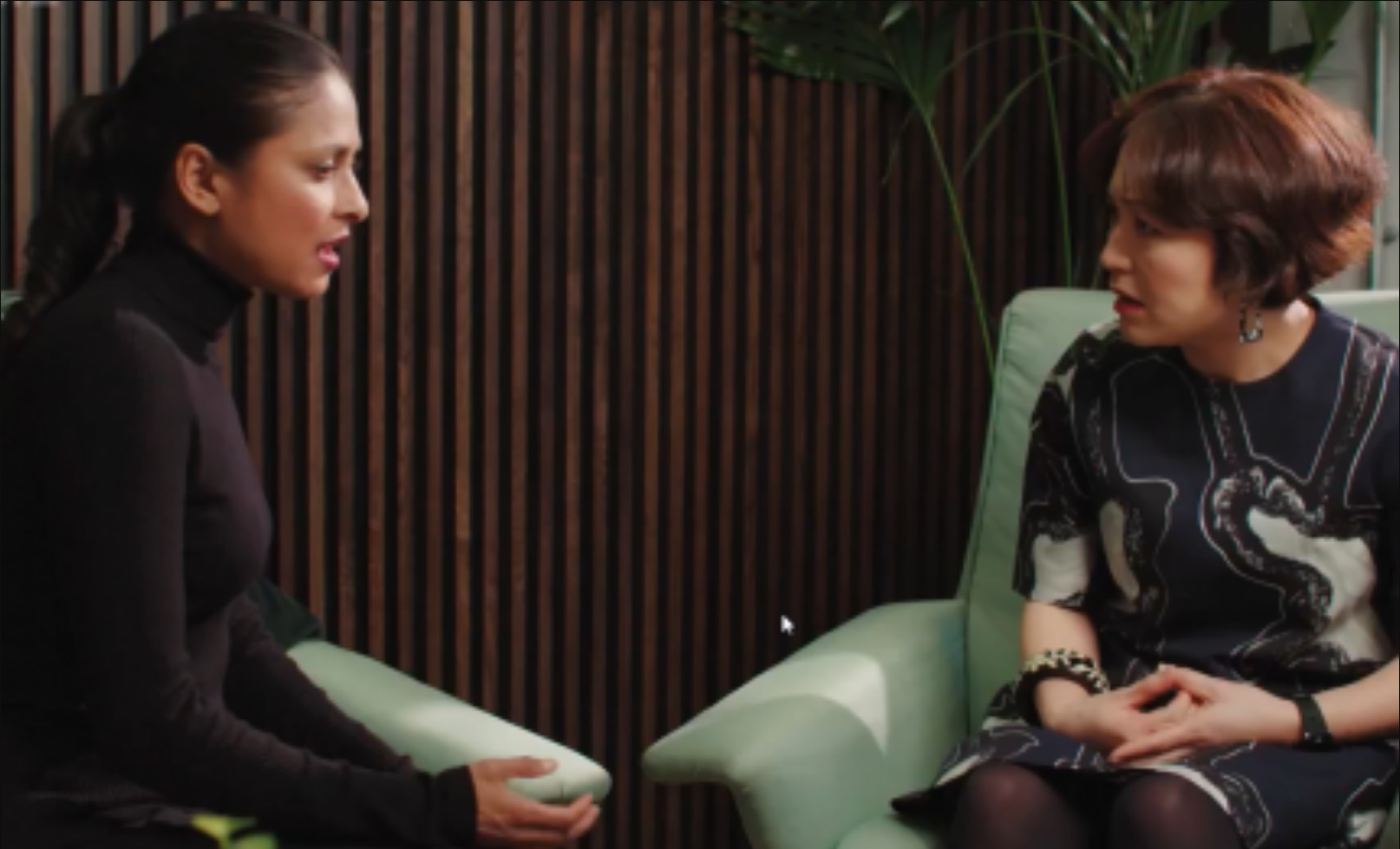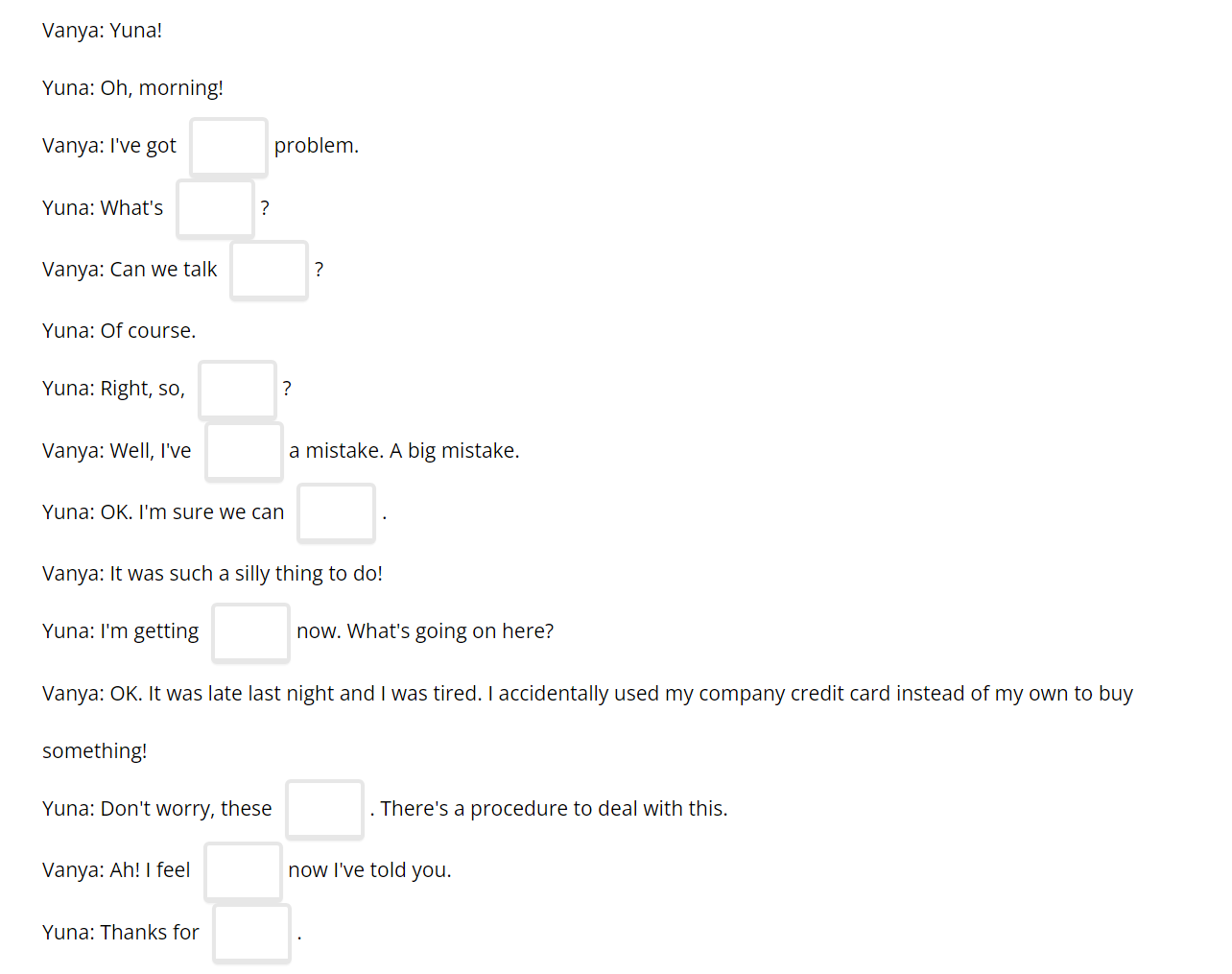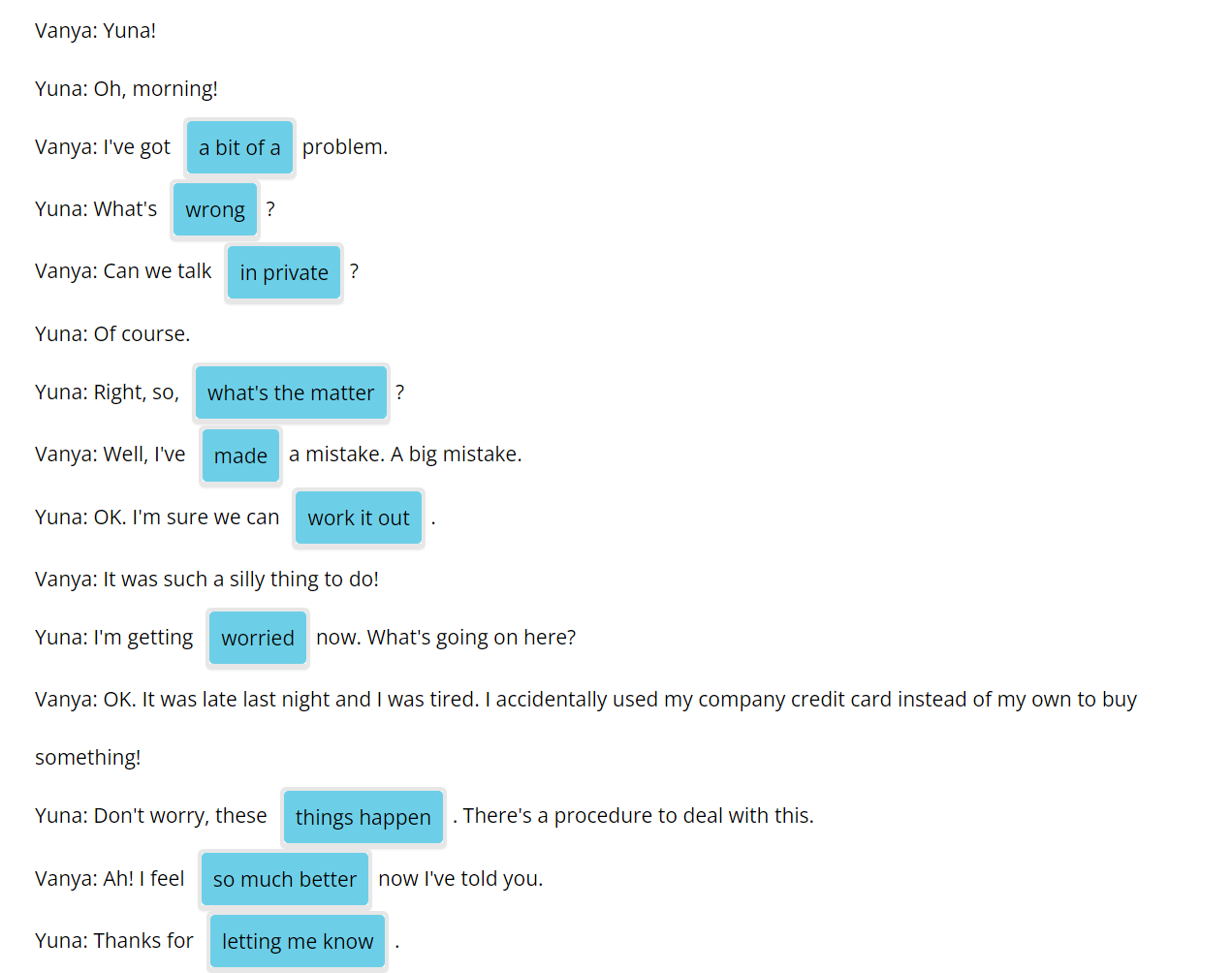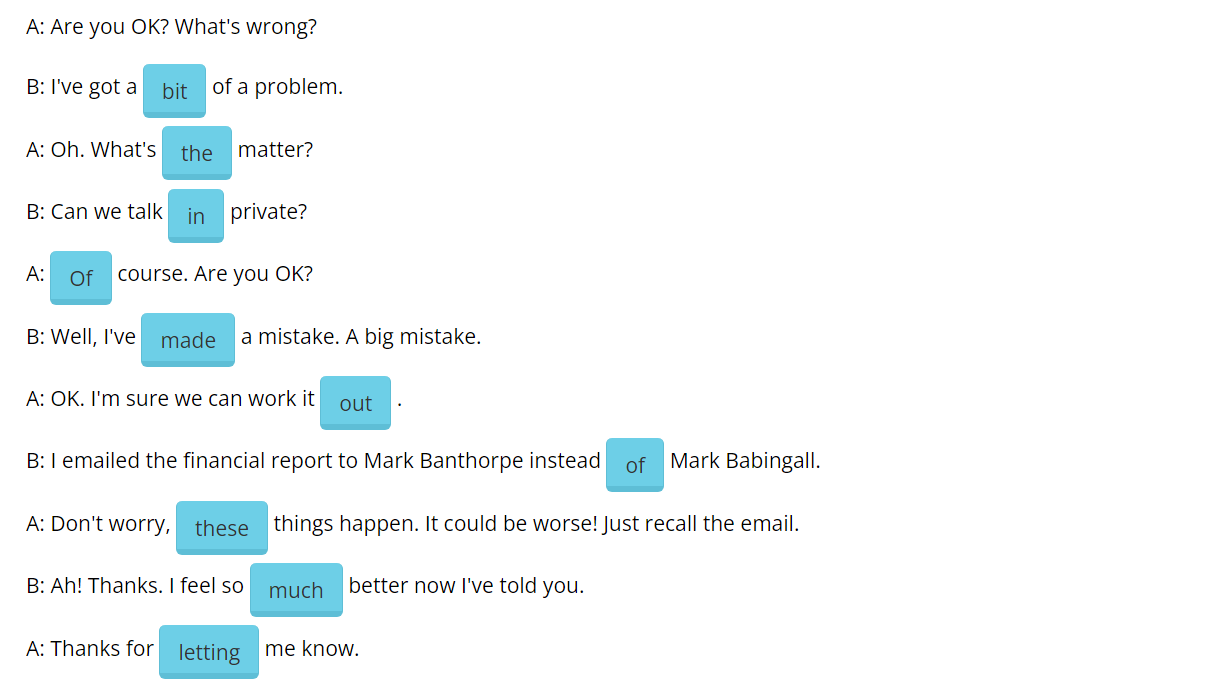【B2-Speaking】02 Dealing with a problem-处理问题
【B2-Speaking】02 Dealing with a problem-处理问题

In this video, Vanya goes to Yuna with a problem. Listen to the language they use for dealing with a problem and practise saying the useful phrases.在这段视频中,Vanya 向尤娜提出了一个问题。聆听他们用于处理问题的语言并练习说出有用的短语。
Do the preparation exercise first. Then watch the video and do the exercises to check your understanding and practise the language.先做准备练习。然后观看视频并做练习以检查您对语言的理解和练习。
Preparation-准备
Responding to news – preparation
Put the phrases in the correct groups
- Question
Telling someone about a problem
Helping someone who has a problema. Don’t worry, these things happen.
b. I’ve made a mistake
c. What’s the matter?
d. I’ve got a bit of a problem.
e. I’m sure we can work it out.
f. Thanks for letting me know.
g. Oh, it was such a silly thing to do!
h. I feel so much better now I’ve told you.
- Answer
Telling someone about a problem
- I’ve got a bit of a problem.
- I’ve made a mistake
- Oh, it was such a silly thing to do!
- I feel so much better now I’ve told you.
Helping someone who has a problem
- What’s the matter?
- I’m sure we can work it out.
- Don’t worry, these things happen.
- Thanks for letting me know.

Transcript-对话脚本
English
Ana: Hi! I’m Ana. Welcome to What to Say!
Do you know what to say when you need to deal with a problem? Listen out for useful language for dealing with a problem. Then, we’ll practise saying the new phrases – after this.
Vanya: Yuna!
Yuna: Oh, morning!
Vanya: I’ve got a bit of a problem.
Yuna: What’s wrong?
Vanya: Can we talk in private?
Yuna: Of course.
Yuna: Right, so, what’s the matter?
Vanya: Well, I’ve made a mistake. A big mistake.
Yuna: OK. I’m sure we can work it out.
Vanya: It was such a silly thing to do!
Yuna: I’m getting worried now. What’s going on here?
Vanya: OK. It was late last night and I was tired. I wasn’t concentrating and I accidentally used my company credit card instead of my own to buy something!
Yuna: Don’t worry, these things happen. There’s a procedure to deal with this. How much did you spend?
Vanya: It was quite expensive.
Yuna: How expensive?
Vanya: It was very expensive.
Yuna: Vanya, how expensive?
Vanya: £3,782 … and 56 pence.
Yuna: What? You spent £3,782?!
Vanya: … and 56 pence.
Yuna: What was it? Vanya?
Vanya: Just a weekend break! I just like a really nice hotel!
Yuna: OK, I see. Thanks for letting me know.
Vanya: Ah! I feel so much better now I’ve told you. Please don’t tell Noelia.
Yuna: Oh, I’m definitely going to tell her!
Noelia: Hi!
Vanya: Hi!
Ana: Hello again! Wow, that’s a lot of money for a weekend break. So, did you notice the useful phrases used for dealing with a problem? Listen to me and then repeat.
What’s wrong?
I’ve got a bit of a problem.
Could we talk in private?
What’s the matter?
I’ve made a mistake.
I’m sure we can work it out.
Don’t worry, these things happen.
Thanks for letting me know.
I feel so much better now I’ve told you.
Ana: Try and use some of these phrases the next time you need to deal with a problem in English. Bye for now!
English-Chinese
Ana: Hi! I’m Ana. Welcome to What to Say! 安娜:嗨!我是安娜。欢迎来到说什么!
Do you know what to say when you need to deal with a problem? Listen out for useful language for dealing with a problem. Then, we’ll practise saying the new phrases – after this.当你需要处理问题时,你知道该说什么吗?倾听对处理问题有用的语言。然后,我们将练习说新短语——在此之后。
Vanya: Yuna!万尼亚:尤娜!
Yuna: Oh, morning!尤娜:噢,早上好!
Vanya: I’ve got a bit of a problem. 万尼亚:我遇到了一点问题。
Yuna: What’s wrong?尤娜:怎么了?
Vanya: Can we talk in private?万尼亚:我们可以私下谈谈吗?
Yuna: Of course.尤娜:当然。
Yuna: Right, so, what’s the matter? Yuna:好吧,那么,有什么事吗?
Vanya: Well, I’ve made a mistake. A big mistake.万尼亚:好吧,我犯了一个错误。一个大错误。
Yuna: OK. I’m sure we can work it out.尤娜:好的。我确信我们能解决这个问题。
Vanya: It was such a silly thing to do! 万尼亚:这样做真是太愚蠢了!
Yuna: I’m getting worried now. What’s going on here? Yuna:我现在开始担心了。这里发生了什么?
Vanya: OK. It was late last night and I was tired. I wasn’t concentrating and I accidentally used my company credit card instead of my own to buy something! 万尼亚:好的。昨晚很晚了,我很累。我注意力不集中,不小心用了公司的信用卡而不是自己的信用卡去买东西!
Yuna: Don’t worry, these things happen. There’s a procedure to deal with this. How much did you spend? Yuna:别担心,这些事情都会发生。有一个程序可以处理这个问题。你花了多少钱?
Vanya: It was quite expensive.万尼亚:相当昂贵。
Yuna: How expensive?尤娜: 有多贵?
Vanya: It was very expensive.万尼亚:非常昂贵。
Yuna: Vanya, how expensive?尤娜:万尼亚,多少钱?
Vanya: £3,782 … and 56 pence.Vanya:3,782 英镑……56 便士。
Yuna: What? You spent £3,782?! 尤娜:什么?你花了 3,782 英镑?!
Vanya: … and 56 pence. Vanya:……还有 56 便士。
Yuna: What was it? Vanya?尤娜:那是什么?万尼亚?
Vanya: Just a weekend break! I just like a really nice hotel!万尼亚:只是周末休息!我只是喜欢一家非常好的酒店!
Yuna: OK, I see. Thanks for letting me know.尤娜:好的,我明白了。谢谢你让我知道。
Vanya: Ah! I feel so much better now I’ve told you. Please don’t tell Noelia.万尼亚:啊!我告诉你之后我感觉好多了。请不要告诉诺莉亚。
Yuna: Oh, I’m definitely going to tell her!Yuna:噢,我一定要告诉她!
Noelia: Hi!诺埃利亚:嗨!
Vanya: Hi!万尼亚:嗨!
Ana: Hello again! Wow, that’s a lot of money for a weekend break. So, did you notice the useful phrases used for dealing with a problem? Listen to me and then repeat. 安娜:你好!哇,周末休息可得花不少钱啊。那么,您是否注意到用于处理问题的有用短语?听我说,然后重复。
What’s wrong?怎么了?
I’ve got a bit of a problem.我有一点问题。
Could we talk in private?我们可以私下谈谈吗?
What’s the matter?怎么了?
I’ve made a mistake.我犯了一个错误。
I’m sure we can work it out.我确信我们能解决这个问题。
Don’t worry, these things happen.别担心,这些事情都会发生。
Thanks for letting me know.谢谢你让我知道。
I feel so much better now I’ve told you.我告诉你之后我感觉好多了。
Ana安娜: Try and use some of these phrases the next time you need to deal with a problem in English. Bye for now!:下次您需要处理英语问题时,尝试使用其中一些短语。暂时再见!
Task 1-任务1
Dealing with a problem – 1
Put the events from the story in order.
- Question
()Vanya asks Yuna if they can talk.
()Yuna tells Vanya not to worry and says there’s a solution.
()Yuna is shocked to hear how much Vanya spent.
()Yuna wants to know what the mistake was.
()Vanya tells Yuna there’s a problem.
()Vanya tells Yuna she used the company credit card by accident.
- Answer
(2)Vanya asks Yuna if they can talk.
(5)Yuna tells Vanya not to worry and says there’s a solution.
(6)Yuna is shocked to hear how much Vanya spent.
(3)Yuna wants to know what the mistake was.
(1)Vanya tells Yuna there’s a problem.
(4)Vanya tells Yuna she used the company credit card by accident.

Task 2-任务2
Dealing with a problem – 2
Complete the dialogue.
- Question
First part
1.I can’t __
2.Congratulations! That’s __
3.I’m really pleased __
4.Oh __
5.Oh no, that’s __
6.Well __
7.What a __
8.Can I __Second part
a.awful.
b.believe it!
c.dear.
d.do anything to help?
e.done!
f.for you.
g.shame.
h.wonderful!

- Answer
Vanya: Yuna!
Yuna: Oh, morning!
Vanya: I’ve got (a bit of a) problem.
Yuna: What’s (wrong)?
Vanya: Can we talk (in private)?
Yuna: Of course.
Yuna: Right, so, (what’s the matter)?
Vanya: Well, I’ve (made) a mistake. A big mistake.
Yuna: OK. I’m sure we can (work it out) .
Vanya: It was such a silly thing to do!
Yuna: I’m getting (worried) now. What’s going on here?
Vanya: OK. It was late last night and I was tired. I accidentally used my company credit card instead of my own to buy something!
Yuna: Don’t worry, these (things happen) . There’s a procedure to deal with this.
Vanya: Ah! I feel (so much better) now I’ve told you.
Yuna: Thanks for (letting me know) .

Task 3-任务3
Dealing with a problem – 3
Write one word to fill the gap.
- Question
A: Are you OK? What’s wrong?
B: I’ve got a (1) of a problem.
A: Oh. What’s (2) matter?
B: Can we talk (3) private?
A: (4) course. Are you OK?
B: Well, I’ve (5) a mistake. A big mistake.
A: OK. I’m sure we can work it (6) .
B: I emailed the financial report to Mark Banthorpe instead (7) Mark Babingall.
A: Don’t worry, (8) things happen. It could be worse! Just recall the email.
B: Ah! Thanks. I feel so (9) better now I’ve told you.
A: Thanks for (10) me know.
- Answer
A: Are you OK? What’s wrong?
B: I’ve got a (bit) of a problem.
A: Oh. What’s (the) matter?
B: Can we talk (in) private?
A: (Of) course. Are you OK?
B: Well, I’ve (made) a mistake. A big mistake.
A: OK. I’m sure we can work it (out) .
B: I emailed the financial report to Mark Banthorpe instead (of) Mark Babingall.
A: Don’t worry, (these) things happen. It could be worse! Just recall the email.
B: Ah! Thanks. I feel so (much) better now I’ve told you.
A: Thanks for (letting) me know.

Discussion-讨论
When was the last time you helped someone with a problem at work?
您最后一次帮助某人解决工作中的问题是什么时候?